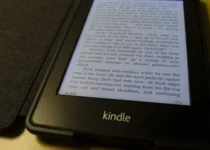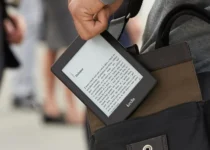10 Pros and Cons of Using an E-Reader for Reading Books
An e-reader is a device that can be used to read digital books and other publications. It has become increasingly popular in recent years due to its convenience, portability, and long battery life. E-readers are becoming more widely adopted by readers of all ages as technology develops and costs decrease.
In this article, we will discuss the pros and cons of using an e-reader for reading books. So, you can decide for yourself if an e-reader is a right choice for you.
10 Pros and Cons of using an E-Reader for Reading Books.
7 Pros of E-Readers
1. Convenience
E-readers are lightweight and easy to carry around, making it convenient for readers who are always on the go. They also have a long battery life, so readers don’t need to worry about running out of power while they are reading.
2. Cost
E-readers are typically much cheaper than physical books, as they can be purchased digitally and downloaded onto the device. Furthermore, e-books tend to be cheaper than physical books, meaning readers can save money by downloading their favorite titles.
3. Variety
E-readers offer a wide selection of books that are not available in physical form. This makes it much easier for readers to find the exact book they are looking for without having to search multiple stores and wait for delivery times.
4. Accessibility
E-readers can be used to read books from any location, as long as the reader has access to an internet connection. This makes them perfect for travelers who want to enjoy their favorite book without having to worry about packing and carrying a physical copy.
5. Eco-friendly
As e-readers operate completely digitally, they are much more eco-friendly than physical books. This means that readers can reduce their environmental impact by using e-readers over physical copies of books.
6. You can change the text size
E-readers allow you to easily adjust the text size, making it easier for people with visual impairments to read.
7. Built-in dictionary
Some e-readers come with built-in dictionaries, so if you don’t understand a word, you can quickly look it up.
3 Cons of E-Readers
1. Limited physicality
Many readers prefer to feel the book in their hands and to experience the smell of a new book. With an e-reader, the experience is not as sensory and physical.
2. Screen glare
Depending on the device, some e-readers may suffer from screen glare when they are used in direct sunlight or other bright environments.
3. Inability to lend
E-readers cannot be easily shared with others, as they typically require special software that allows the reader’s account to be accessed in order for someone else to use the device.
Why do people choose Paperback over E-Reader?
Though e-readers are becoming more and more popular, there are still many people who prefer to read physical books. There are several reasons why people prefer Paperback over E-Reader:
1. They Prefer the Feeling of a Physical Book in their Hands: One of the biggest appeals of a physical book is the tactile experience of holding a book in your hands. There’s something comforting and nostalgic about the physical experience of holding a book and turning its pages, something that e-readers can’t replicate.
2. They Don’t Have to Worry About Charging: One of the biggest frustrations people have with their e-readers is that they need to be charged. With a physical book, you don’t have to worry about charging your device or running out of battery.
3. They Can Easily Highlight and Make Notes: Some readers find it difficult to highlight and make notes on their e-readers due to the small screen size. With a physical book, it’s much easier to make annotations and highlight important passages.
4. They Can Also Gift Books: With e-readers, you can generally only loan the books out for a limited time or buy separate copies. With physical books, readers can easily gift them to friends and family without any complications.
5. Books Can Be Collected: For some readers, collecting books has always been an important part of the reading experience. E-readers can’t recreate this experience since all the books are stored in a digital library on one device.
Physical books offer something that e-readers simply can’t replace and this is why many readers still prefer Paperback over E-Reader. It’s a personal choice and as technology continues to evolve, it will be interesting to see how the book world changes in the future.
Read Also: Things To Consider When Choosing E-Reader
FAQs
Q: Is an e-reader better for your eyes than a physical book?
A: Generally speaking, yes. E-readers are designed to reduce the amount of strain placed on the reader’s eyes due to factors such as screen glare and font size. However, if you suffer from any specific visual impairments, it is best to consult with an optometrist before making a purchase.
Q: Do e-readers allow you to take notes?
A: Yes, some e-readers do have the ability to take notes and highlight text while you are reading. This feature can be helpful for readers who are studying or want to easily reference certain passages later on.
Q: Are e-readers eco-friendly?
A: Yes, e-readers are much more eco-friendly than physical books. They do not require the use of paper or other resources in order to be produced, and they also have a much longer lifespan than traditional books. This means that fewer resources are needed in order to produce an e-reader, thus reducing the environmental impact associated with reading.
Q: Do Ereaders affect sleep?
A: Studies have shown that blue light, which is emitted from many electronic devices including e-readers, can disrupt sleep patterns and cause insomnia. To reduce the risk of this happening, it is recommended that you limit your use of e-readers before bedtime or utilize a feature such as night shift to reduce the amount of blue light your device emits.
Additionally, you can also use an e-reader that is specially designed to reduce blue light emission. This will help ensure that you are not being exposed to excessive amounts of blue light while reading on an e-reader.
Q: How do I know which e-reader is right for me?
A: The best way to determine which e-reader is best for you is to consider how you plan on using the device. Think about factors such as screen size, battery life, and connectivity options in order to determine which device will work best for your specific needs. Additionally, be sure to check out reviews from other customers before making a purchase to ensure that you are getting the best product for your money.
Q: Are e-readers waterproof?
A: Some e-readers are designed to be durable and water resistant, however, this doesn’t mean that they are completely waterproof.
Conclusion
E-readers can be a great way to read books without having to worry about carrying around physical copies. However, they still lack the sensory experience that many readers prefer.
Ultimately, it is up to each individual reader to decide if an e-reader is a right option for them. Regardless of which side of the debate you fall on, one thing is clear – e-readers have provided an innovative way to read books that can be enjoyed by all.




2 Comments